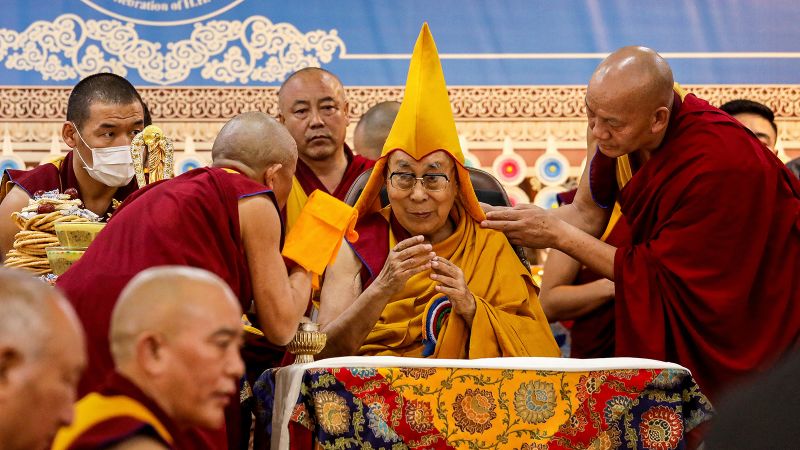
The Dalai Lama has announced that he will have a successor after his death, continuing a centuries-old tradition that has become a flashpoint in the struggle with China’s Communist Party over Tibet’s future. Tibetan Buddhism’s spiritual leader made the declaration on Wednesday in a video message to religious elders gathering in Dharamsala, India, where the Nobel Peace laureate has lived since fleeing a failed Tibetan uprising against Chinese communist rule in 1959.
“I am affirming that the institution of the Dalai Lama will continue,” the Dalai Lama said in the pre-recorded video, citing requests he received over the years from Tibetans and Tibetan Buddhists urging him to do so. “The Gaden Phodrang Trust has sole authority to recognize the future reincarnation; no one else has any such authority to interfere in this matter,” he added, using the formal name for the office of the Dalai Lama. The office should carry out the procedures of search and recognition of the future Dalai Lama “in accordance with past tradition,” he said.
Historical Context and Current Challenges
The announcement comes as the Dalai Lama approaches his 90th birthday, a milestone that has intensified discussions about his succession. Historically, the selection of a new Dalai Lama has involved a complex process of spiritual and cultural traditions, deeply rooted in Tibetan Buddhism. However, the political landscape has dramatically shifted since the Dalai Lama fled to India in 1959, following a failed uprising against Chinese rule.
China’s government, which views Tibet as an integral part of its territory, has consistently sought to exert control over the selection of religious leaders within its borders. This has led to a contentious relationship with the Tibetan spiritual community, particularly concerning the reincarnation of the Dalai Lama.
The Implications of Dual Successors
The Dalai Lama’s statement that his successor will be born in the “free world” outside China sets the stage for a potential conflict with Beijing. In a memoir published in March, he urged his followers to reject any candidate selected by the Chinese government, which could lead to the emergence of two rival Dalai Lamas: one recognized by Tibetan leaders in exile, and another by the Chinese Communist Party.
According to experts, this scenario could further complicate the already strained relations between Tibetans and the Chinese authorities. Robert Barnett, a scholar of Tibetan studies, notes, “The issue of succession is not just a religious matter but a deeply political one. The Chinese government’s involvement in religious affairs is seen as an infringement on religious freedom by many Tibetans.”
Expert Opinions and Future Prospects
Experts in religious and geopolitical affairs are closely watching the developments, noting that the Dalai Lama’s decision could have significant implications for the future of Tibetan Buddhism and its followers. The Dalai Lama’s influence extends beyond religious boundaries, as he is also a symbol of Tibetan identity and resistance against Chinese rule.
Meanwhile, the international community remains divided on the issue. Some countries have expressed support for the Dalai Lama’s stance, emphasizing the importance of religious freedom and cultural preservation. Others, wary of China’s economic and political influence, have been more cautious in their responses.
“The Dalai Lama’s decision to ensure a successor is a strategic move to preserve Tibetan culture and autonomy,” says Dr. Tenzin Dorjee, a professor of religious studies. “However, it also risks escalating tensions with China, which could have broader geopolitical repercussions.”
Looking Ahead
The Dalai Lama’s announcement underscores the ongoing struggle for cultural and religious autonomy in Tibet. As the world watches, the process of selecting his successor will likely become a focal point for both Tibetan leaders in exile and the Chinese government. The outcome could shape the future of Tibetan Buddhism and its followers for generations to come.
As the Dalai Lama approaches his 90th birthday, the spiritual leader’s commitment to ensuring the continuity of his institution reflects his enduring influence and the challenges that lie ahead. The coming years will be pivotal in determining how the succession process unfolds and the impact it will have on the broader geopolitical landscape.





